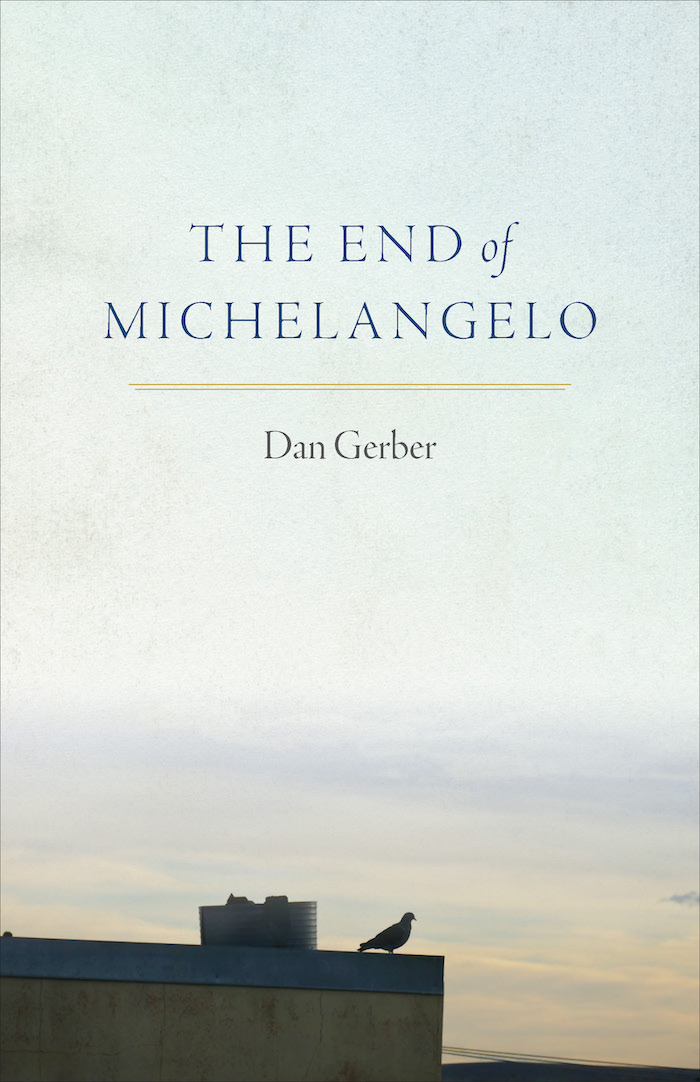
ISBN: 9781556596599
Format: Paperback
Reviews
“Gerber’s poems acknowledge both the fragility of the times we live in and how very much alive we still are.” —Santa Barbara Independent
“In the walk toward death’s horizon or in the wake of death’s intervention into our daily existence, we often turn to poems for consolation, for insight and illumination, as a tether to pull us across the chasm of loss and absence. The poems in Gerber’s tenth book of poetry, The End of Michelangelo, are a fine and priceless gift, a worthy addition to millennia of writing that considers what it means to age and to pass from our earthly bodies.” —New York Journal of Books
“After a lifetime of poems that attend to and celebrate the greater-than-human world, Gerber confesses there was a time when ‘I had no sense / the trees and animals / I walked among were something / I was not.’ It’s this kind of intimacy and humility—a recognition we are one among many species, all related to one another—that informs such aphoristic lines as ‘Ages ago, I surrendered to nature so this / page could be here and not be blank.’ This is a book of gratitude that bows to the miraculous mystery of existence, the poet’s heartbeat ‘chanting thank you, thank you, thank you without quite / caring who you was.'” —Orion
“If poetry can lay claim to a healing or restorative power, it may well be found in Gerber’s poetry. In this, his 10th collection (after Particles: New and Selected Poems), Gerber draws on personal memories and the Central California landscape to reveal the fleeting, everyday marvels which are always available to us if we pay enough attention. . . . The poet’s Zen openness to nature attunes him to synthesize what he sees with what he feels through spare but immediate language, summing up his poetics in one concise sentence: ‘Without poetry the visible and invisible/ worlds wouldn’t be aware of each other’. . . . A timeless oasis of quietude in our contemporary maelstrom of uncertainty and apprehension, Gerber’s poetry vividly reminds us that while ‘the scale of pleasure ascends into terror…/ the pleasure is in being alive.’ —Library Journal
“Encounters with the natural world fill the verses of The End of Michelangelo. . . . Many verses here can be characterized by a mindfulness, or full consciousness, of the present moment. “Mono no aware” (the title is a Japanese term for awareness of the impermanence of things) is one of the standouts, describing the poet’s own experience of life as ‘a silent, / second actor in / every closely watched scene.’ Other poems acknowledge themselves as vain attempts to catch at the ungraspable; time and again, Gerber mentions ‘this fleeting identity’ or ‘our fleeting selves.’ Nothing here is monumentalized in an ode to permanence. . . . The End of Michelangelo initially suggests a funereal theme, but there’s far more life than death here. And age is no tragedy. . . . ‘’Rue, not rage,’ he quotes Samuel Menashe on the book’s final page, is what focuses his attention and fuels his creativity. Evening may be approaching, but there is more day to dawn.” —Las Vegas Review of Books
“This is Dan Gerber at his most celebratory and most deliberate, embodying the beauty and belief of poetry’s power and purpose, particularly in desperate times; poetry that alerts us to living fully and completely as ‘some beacon of delight / with the sadness of things’.” —Minderbinder Review of Books
